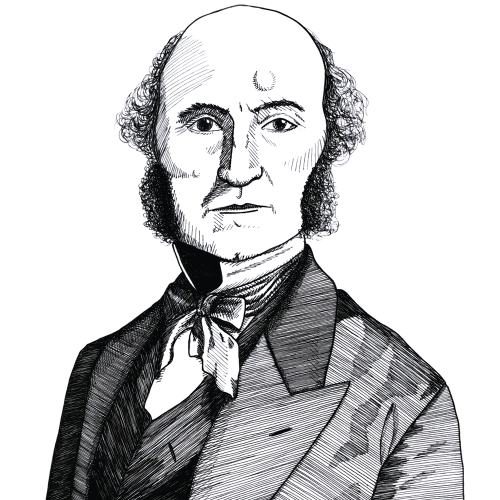Liberty Matters
Mill and the Marginal Revolution
 This is the question posed:
This is the question posed:There seems to be an elephant in the room that no one has talked about, namely the marginal revolution of the 1870s. I would like to know to what extent does this revolution in understanding make some of JSM’s economic views old fashioned, out of date, and beside the point?
The marginal revolution vastly changed the nature of economic theory, but not necessarily for the better. Most importantly, perhaps, it turned economics from a study of the national economy into a study of individual decisionmaking. It thus took economics from its original macro orientation – the wealth of nations – and turned it into a study of incremental changes at the micro level. The macro aspects of economic theory didn’t disappear, but were relegated to the then-less-important and mainly secondary study of the theory of the cycle. Static equilibrium became the standard approach rather than the dynamic disequilibrium that was embedded within classical theory.
Second, the marginal revolution took economics from a study of the supply side and shaped it into a study that began, and for the most part remained, on the demand side. Marginal utility became the core which sought to explain how an individual’s demands were prioritized. The supply side of the economy was then seen to conform to the structure of demand in an almost passive way. The Keynesian Revolution would complete the process by taking even the theory of the cycle from the supply side to the demand side. The marginal propensity to consume sounded much like the economics that was already common currency, even though an individualistic concept was being applied to the entire body of consumers.
Third, classical economics was conducted in words and concepts. The marginal revolution introduced not only elements which could never be observed (marginal utility), but was readymade for the mathematization of economic discourse. As Blaug pointed out, “the dominant role of the concept of substitution at the margin in the new economics accounts for the sudden appearance of explicitly mathematical reasoning.”[94] It was all very well for Marshall to have left the math to the appendix. But no one familiar with modern theory would be unaware the extent to which mathematics (and the use of diagrams) now dominate. A modern economist could only with difficulty read Blaug, never mind Mill.
Lastly, let me touch on Mill’s theory of value. I can see how Mill’s discussion will seem hopeless to anyone brought up on modern economics. But the question he asked was different from the one we typically try to answer today, which is how do goods and services end up with a particular price. He asked what caused the prices of two goods to be different from each other. Why do you have to pay more for a Ferrari than a Ford? More than that, while we analyze supply and demand in terms of price, Mill used “value” on what we would now think of as the vertical axis. By thinking in terms of value rather than price, he was emphasizing that production in a market economy involved the determination of relative prices and was focused on exchange. By using the more anodyne “money price” on the vertical axis instead of value, we push to the background that something must be given up to get something else.
Mill is unquestionably “old fashioned,” but his understanding is far from “out of date and beside the point.” What he is, however, is unreadable. I, on the other hand, take enormous pleasure in reading Mill (in the same way and for the same reason that I enjoy Mises and Hayek) because he discusses an economy that is visible everywhere I go. I can hardly imagine a day when what he wrote will have been transcended and have become genuinely out of date. Much of what he writes is no longer of concern. His examples are so long-winded that it can drive you crazy unravelling what he has in mind. But we are also talking here about the man with the 19th century’s highest IQ[95] who also suffered under the most extraordinarily rigorous education regime ever imposed on anyone.
I am an imperfect vehicle to explain what Mill meant, but then again so was he. His ideas were profound but also humane. In the political realm, his On Liberty and On Utilitarianism remain at the heart of our civilization. It is regrettable in my view that the same cannot be said about his economics as well.
Endnotes
[94.] Mark Blaug, Economic Theory in Retrospect. 2nd ed. (Homewood, Ill.: R. D. Irwin, 1968), p. 300.
[95.]"Estimated IQs of the Greatest Geniuses of the 15th-19th Centuries," From Catharine Morris Cox, The Early Mental Traits of Three Hundred Geniuses (Stanford University Press, 1926). At Assessment Psychology Online.
Copyright and Fair Use Statement
“Liberty Matters” is the copyright of Liberty Fund, Inc. This material is put on line to further the educational goals of Liberty Fund, Inc. These essays and responses may be quoted and otherwise used under “fair use” provisions for educational and academic purposes. To reprint these essays in course booklets requires the prior permission of Liberty Fund, Inc. Please contact oll@libertyfund.org if you have any questions.